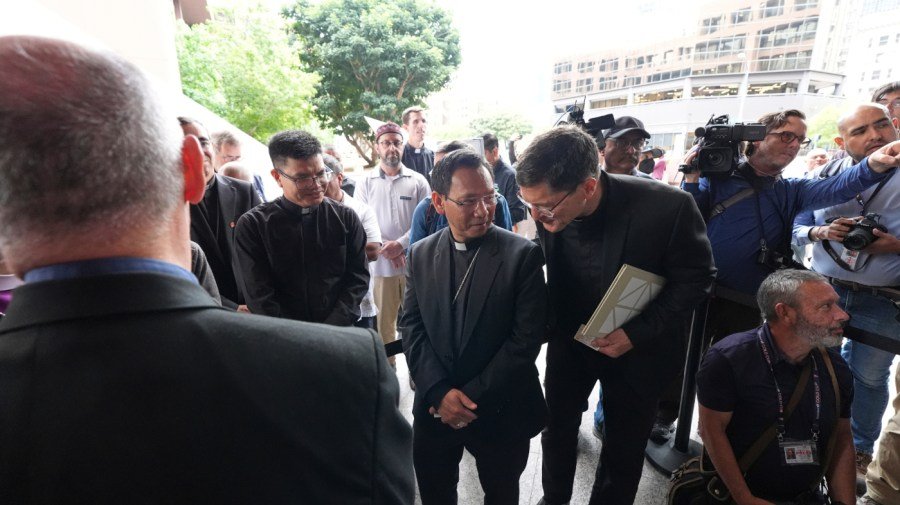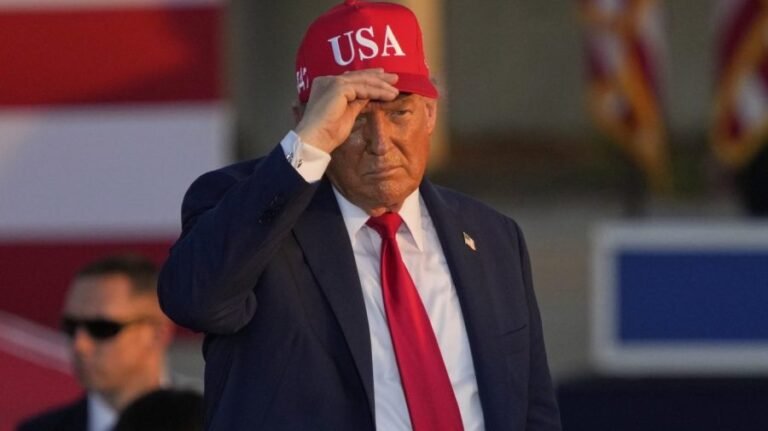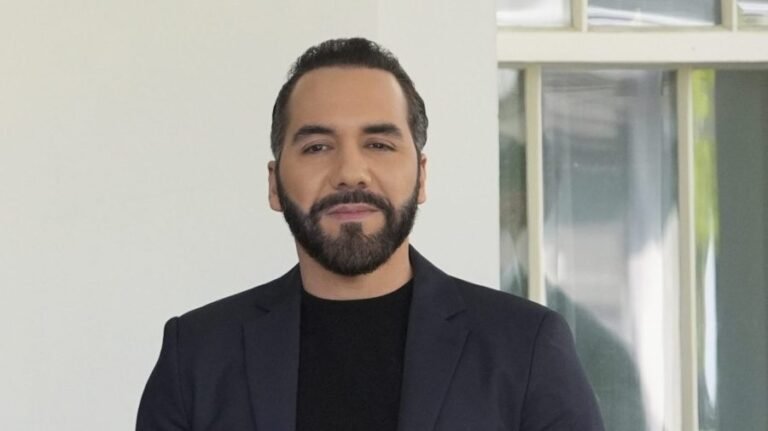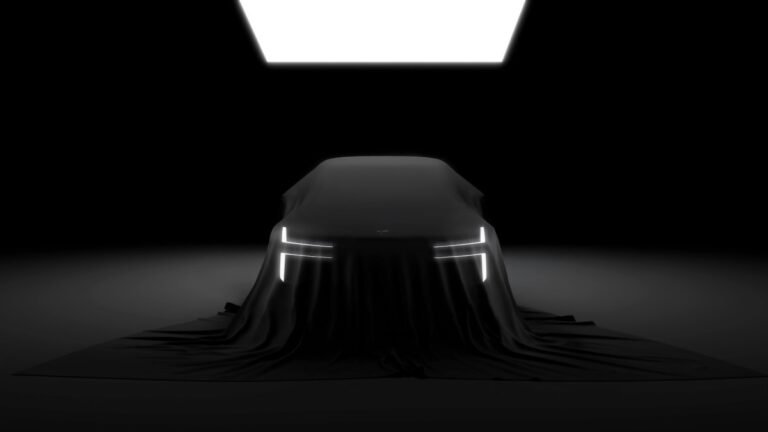
On June 20, designated as World Refugee Day by the United Nations High Commissioner for Refugees, an interreligious group of clergy entered the federal building in San Diego, Calif., as a judge was about to hear two immigration cases. Among those present was the newly appointed Catholic bishop of San Diego, Michael Pham.
Inside the courthouse were Immigration and Customs Enforcement agents waiting to detain the migrants once their cases were heard.
As Bishop Pham walked toward the courtroom, he noticed that the masked agents “kind of scattered and went away.” Scott Reid, a member of the San Diego Organizing Project, said: “Like the story of Moses and Exodus, the Red Sea parted.”
This is exactly what Pope Leo XIV had in mind.
Michael Pham is the first U.S. bishop appointed by Pope Leo XIV. And in another first, Pham is the first person of Vietnamese descent to be made a diocesan bishop in the U.S.
Born in Da Nang, Vietnam, in 1967, Bishop Pham left the country at age 13 on a rice barge. Pursued by the communists, he was at sea for days without food or water. Dead bodies were scattered about the floor of the makeshift boat. As Pham later recalled, “I thought they were sleeping, but I came to realize they were dead.”
Accompanying his older sister and younger brother, the siblings entered the U.S. in 1981 thanks to the sponsorship of an American family and relocated to Blue Earth, Minn. Bishop Pham later moved to San Diego, where he went to high school and studied aeronautical engineering. After graduating from college, he entered a local seminary to begin his studies for the priesthood.
Bishop Pham once described San Diego as “heaven on earth,” and he identifies strongly with his fellow refugees. He is deeply offended by masked ICE agents silently arresting migrants and relocating them to detention centers, recalling similar experiences in Vietnam as a 10-year-old, “seeing people being taken away without an obvious reason.”
Bishop Pham is exactly the type of person Pope Leo XIV wants to lead the Roman Catholic Church. And he is very much in sync with the pope’s position on immigration. In 2020, the future pope declared that the Catholic Church “is called to be a place of refuge and assistance, a place where God’s mercy is revealed, lived and experienced. A place where what is truly God’s justice — not human justice — is made manifest.”
As the pope, Leo XIV has told his brother bishops and priests, “It is necessary to be close in order to serve.”
Standing with migrants in courtrooms who, in Bishop Pham’s words, “come in fear,” is exactly what Pope Leo XIV wants others to emulate. As the Pope’s younger brother, John Prevost, recently told a reporter: “I know he’s not happy with what’s going on with immigration. I don’t think he’ll be the silent one.”
Trump’s reported order that ICE agents meet his quota of indiscriminately arresting and deporting 3,000 immigrants daily, and in some cases, providing them with a one-way ticket to notorious detention facilities, has alienated many once-friendly Catholic leaders.
One of them is San Bernardino Bishop Alberto Rojas. Recently, ICE agents detained migrants on the grounds of two local parishes in his diocese, prompting Rojas to issue a letter condemning the indiscriminate actions as lacking “respect for their right to due process and their dignity as children of God.”
In an email to me, Steven P. Millies, director of the Bernadin Center and professor of Public Theology at Catholic Theological Union, said the nation’s Catholic bishops “are galvanized by how the Trump administration has treated immigrants and Catholic ministries that assist immigrants.”
Millies called it “a new moment in the Catholic Church’s relationship to American politics, in part because of Pope Francis’s long influence, but also because Trump has made this new moment.”
It is a new moment indeed.
Back in 2021, Los Angeles Archbishop Jose Gomez, then-president of the U.S. Conference of Catholic Bishops, issued a churlish statement condemning the newly-inaugurated Joe Biden for pursuing “certain policies that would advance moral evils and threaten human life and dignity, most seriously in the areas of abortion, contraception, marriage and gender.”
Today, Archbishop Gomez says he is “deeply disturbed by reports of federal agents detaining people in public places, apparently without showing warrants or evidence that those they are taking into custody are in the country illegally.”
Gomez said those actions are “causing panic in our parishes and communities.”
“People are staying home from Mass and work, parks and stores are empty, the streets in many neighborhoods are silent,” he continued. “This situation is not worthy of a great nation.”
The Catholic vote matters. A recent Pew Research Center poll finds that 47 percent of U.S. adults have a personal or family connection to Catholicism, with 20 percent calling themselves Catholic.
Donald Trump knows this. He won the Catholic vote and continues to court Catholics. Shortly after Pope Leo’s election, he invited the pope’s older brother, Louis Prevost, a strong Trump supporter, to a well-publicized visit in the Oval Office.
Trump hopes to have a one-on-one with the new pope, saying that, for him, it “will be a meaningful moment!” But it may not be the moment Trump has in mind.
As immigrants continue to be rounded up and detained, Catholic leaders are increasingly mobilized. Bishop Pham says he and his fellow priests will return to court, and he is establishing a ministry led by Father Scott Santarosa to accompany migrants to their immigration hearings.
Conservative columnist (and Catholic convert) Ramesh Ponnuru says that Trump’s immigration policy needs a “hard reset.” If that doesn’t happen soon, the political peril in which Trump currently finds himself will only increase. And that puts Trump on a collision course with Catholic prelates and the flocks they shepherd.
John Kenneth White is a professor emeritus at The Catholic University of America. His latest book is titled “Grand Old Unraveling: The Republican Party, Donald Trump, and the Rise of Authoritarianism.”




